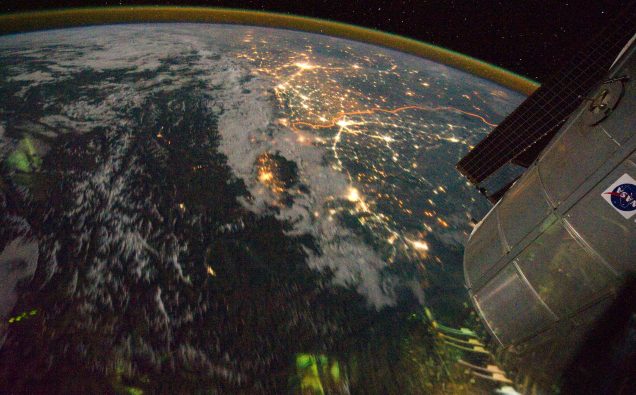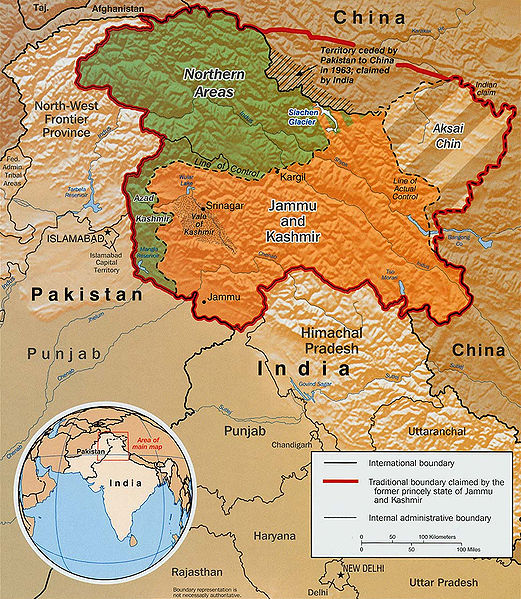
When President Donald Trump meets Indian Prime Minister Narendra Modi during G-7 Summit in France on Monday, it would be exactly three weeks since New Delhi deprived Kashmiris of fundamental rights as it changed the constitutional status of the disputed region under its control.
The international media reports – despite a strict communication apartheid – suggest Indian forces’ arrest of thousands of protesting Kashmir and use of force to quell any dissent, exacerbating the Pakistan-India tensions. South Asian watchers have warned against ramifications of a Pakistan-India conflict from the huge crisis,
A potential nuclear conflagration cannot be anything other than a matter of international peace and security, an organization providing insight on geopolitical issues says while arguing that Kashmir cannot be treated as internal Indian matter or a Pakistan-India bilateral issue.
In its latest look at the simmering conflict over the disputed Himalayan territory, Stratford Worldview notes the situation warrants a close U.S. intelligence watch.
Nuclear-armed Pakistan and India not only have a history of conflicts but now the two neighbors have capabilities to inflict enormous harm on South Asia and beyond. The most recent flare-up has been fueled by Indian Prime Minister Narendra Modi’s August 5 unilateral decision to strip the Kashmir region – under its control – of its autonomy.
The people of Jammu and Kashmir, particularly Muslims, see the move to alter the constitutionally mandated status as a design to upend demographics of their land. Pakistan’s Prime Minister Imran Khan has since then launched a furious diplomatic offensive, calling it a ‘fascist’ move in violation of the relevant UNSC resolutions.
The UNSC addressed the issue last week but did not condemn the Indian action, raising fears of widespread human rights violation in Kashmir, which has been in a lockdown for three weeks. US President Donald Trump has offered to mediate but New Delhi has rebuffed the call. Trump is due to meet Modi in France during the G-7 Summit on Monday.
In the analysis by Charles Glass, Stratford particularly draws CIA’s attention to the dangers including a speactre of nuclear war that ongoing tensions – heightened by an unprecedented Indian clampdown on the region and abrogation of Kashmir’s autonomous status –pose.
Any lapse in close monitoring could present the world a shocking scenario, Glass argues.
“It would be the sight of nuclear war taking millions of lives.”
In view of the massive risks, Stratford contends Kashmir is not neither an internal Indian affair not a bilateral dispute between the South Asian countries.
“Although the stakes in Kashmir could not be higher, the United States and much of the international community call the dispute India’s “internal affair” or a “bilateral” issue between India and Pakistan. It isn’t.
“A potential nuclear conflagration cannot be anything other than a matter of international peace and security. The Indian and Pakistani armed forces possess both strategic and tactical nuclear weapons, which local commanders could use on the battlefield in populated areas. This would be the first use in war of atomic weapons since the U.S. destruction of Hiroshima and Nagasaki in 1945.”
Stratford also notes that the possibility of the conflict going nuclear may have increased on Aug. 16 when Indian Defense Minister Rajnath Singh seemed to abandon India’s “no first use” doctrine when he tweeted that “India has strictly adhered to this doctrine. What happens in the future depends on the circumstances.”
The South Asian standoff is particularly bad as it is widely interpreted in Pakistan as a consequence of the Indian ruling BJP party’s Hinutva ideology which believes in a homogenous country with the majority Hindu population having a complete sway over lives of minorities.
In the last few years, several Muslims have been lynched as the international community watches India’s spiral down from a secular democracy to an exclusionary Hindu society.
Prime Minister Khan has likened RSS, considered the parent organization of BJP, to German Nazis and asked the international community to consider safety of Indian nuclear weapons in the hands of a dangerous regime.
The White House this week said President Trump will raise the issue of human rights and detentions in Kashmir during his meeting with Indian PM Modi.
Trump has been talking to prime ministers of India and Pakistan as part of U.S. efforts to manage the crisis.
Given the international stakes, President Trump’s meeting with Indian PM Modion Monday in France – their first encounter since August 5 clampdown in Kashmir – has assumed much greater importance for world peace and stability.
















